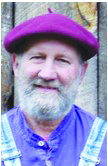A talk with Henry Homeyer, the Gardening Guy
Henry Homeyer’s regular advice about all things gardening has appeared in newspapers, including the Hippo, around New England (currently, his pieces run about once a month, including this week on page 10). He is the author of several books, including The New Hampshire Gardener’s Companion.
What got you into gardening?
I started gardening as a young boy. I’m talking ages 2 or 3. My grandfather in Spencer, Massachusetts, he was an organic gardener starting back in the ’40s … I was born in ’46 — and he just made it fun. He was a fun guy. He taught me a lot but he didn’t tell me to do things. He didn’t give me chores I didn’t want to do, I didn’t have to pull weeds. I got to do things like stir a big wooden rain barrel full of chicken manure and water to … make a manure tea that we would then dip into and put on his tomato plants, and it was all fun. Gardening has been part of my life for 75 years.
What non-native plants do well in New Hampshire or are there any non-native New Hampshire plants you’d recommend?
Well, I recommend native plants whenever possible. If we can plant 90 percent native and 10 percent non-native, or 80-20, that’s a better mix. A lot of the non-natives are not useful to our pollinators and birds who didn’t evolve with them, so our natives are so much better. With that being said, there are certain trees and shrubs, particularly, that are so beautiful I have to have them. I have a Merel magnolia which is going to bloom … big white flowers, blooms in early April — fabulous plant. Not a native. Japanese red maple is another one that you see from time to time that has a deep, rich red leaf all summer long and brilliant in the fall.…. Go to the local nursery, don’t go to a big box store, go to your local nursery … They’re well-educated, generally, and can help you find just the right thing for you and for your part of the state.
Do you have a favorite plant that’s often overlooked?
I have over 100 different species of trees and shrubs. I have more than that in terms of perennial flowers. One that I really like is the candlestick primrose…. It’s a non-native but it grows in moist soil in partial shade or even full shade. It blooms in late May, early June, with a series of blossoms going up a stem. It comes in a variety of colors from magenta and pink to almost white. It’s not well-known but it does very well under old apple trees and that’s where I have a patch and they spread by root, which I like, they’re early, which I like, and they bloom for over a month, which is unusual for a perennial flower.
Besides garden beds, are there other structures you like to build or have in a garden?
Absolutely. I think that because we have such a long winter, and fall and spring don’t have much going on, we need to have things that are three-dimensional besides our flowers. At the entrance of my vegetable garden I built a cedar entrance arbor with cedar poles and a slanted, criss-cross roof, kind of hard to describe…. It is a good structure for growing vines on. I have wisteria growing up that. I have also another vine structure that’s a 10-foot hexagon with a tall roof, again made out of cedar. … In addition to that I have benches, a marble bench, I have sculpture, iron sculpture, ceramic objects, bird baths…. If you have a big garden, if you have some Adirondack chairs at the far end of it, it draws people toward them as a place to sit down. It’s good to have something comfortable and probably in the shade.
What can gardeners do in New Hampshire in the next two weeks for their gardens?
It really depends on what our weather is, but you don’t want to compress your soil by walking in wet soil. You don’t want to rototill your vegetable garden right now. You don’t want to walk in your flower beds to clean them up right now because it’s going to compact the soil. Plants get their oxygen from air spaces in the soil, they don’t get it through their leaves, they get it through their roots. So if the soil is wet and we step on it, it’s compressing it. This is a good time to take inventory on what is growing, what made it through the winter, what’s coming up, and what didn’t. … This is a good time for looking and planning, maybe do a little raking, you can rake the lawn now if it’s dried out, those sorts of things. — Zachary Lewis
Featured image: Henry Homer


